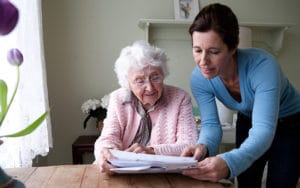A Caregiver’s Job Description Includes Math & Organizational Skills
An adult child who blindly steps into the role of caregiver for an elderly parent may be in for a surprise. Caregiving requires compassion, management-level skills and endurance.
Caring for an elderly family member at home takes more than time and money. The primary caregiver is at the hub of the eldercare services team. A caregiver is the elderly patient’s advocate – the coordinator who takes responsibility for the aging parent’s daily needs and overall care. Working with students and volunteers as an essay writer, I should say that the person taking on the job of a caregiver must have at least basic knowledge in finance, insurance, medication management, scheduling appointments, personal care, and many other areas of professional service.
The Job Description of a Typical Home Caregiver
An elderly person living with a son or daughter doesn’t have an “on-site” health care team tending to his or her needs. Home caregivers need proficient reading, science, social, and math skills to properly care for a loved one unless there are other siblings or family members willing to share the responsibility. Caregivers with appropriate qualifications should have a basic understanding of these areas:
- Routine caregiver. Physically managing daily living needs of the person, including dressing, grooming, bathing, personal hygiene, and managing incontinence.
- Accountant. Taking care of the elderly person’s banking and other financial affairs, possibly through an attorney.
- Liaison for legal affairs. May have to assist attorney by providing legal documents and information on estate, will, or other matters.
- Medical aid. Taking vital signs, changing dressings, administering medications in the right dosages, carrying out therapy instructions, understanding, and following the doctor’s orders.
- Companion. Being present to share free time, go shopping, go to church, etc.
- Recreation therapist. Indulging in activities just for fun, such as watching a movie, getting a little exercise, or taking a stroll outdoors.
- Therapy aid. Carry out therapy exercises between appointments. Must know how to properly lift a patient and perform wheelchair transfers (when necessary) to avoid back injury or injury to the patient.
- Mechanic. Keep equipment such as wheelchairs and patient lifts in good working order or call the proper source for maintenance.
- Secretary. Scheduling appointments, advocating for services and coordinating program involvement. Also orders medical supplies as needed.
- Cook. Keeping track of any special dietary needs. May have to learn how a feeding tube operates or may have to feed the elderly person if he or she cannot manage alone.
- Housekeeper. Responsible for keeping the living area clean, disinfecting supplies as needed.
- Chauffeur. Provide a means of transportation to get to and from appointments.
Caregiving is a Physically Demanding Full-Time Job
Endurance and good physical health are vital for a primary caregiver. A caregiver for the aging parent diagnosed with Alzheimer’s disease must be constantly aware of the dangers associated with dementia. Forgetfulness and wandering away from home are just two common issues a caregiver must deal with. Alzheimer’s patients can experience behavior episodes and mood swings that cause them to become unreasonable and even combative.
Other elderly age-related diseases, injuries, and medical conditions may also require constant attention from caregivers. Old age takes a toll on the healthiest person sooner or later. According to content writer from writemyessaycheap.us, a frail elderly person has many needs throughout the day and night. The elderly person may need nighttime assistance with oxygen or mobility. He or she may need to be repositioned in the bed every few hours at night to prevent skin breakdown and bedsores.
An elderly person who resides in a licensed nursing facility has doctors, nurses, social workers, aides, therapists, caseworkers, and many other paid professionals tending to his or her needs. The situation for the home caregiver is such that one person appears to do the work of at least a half dozen professionals.
An adult child may feel it is his or her duty or obligation to care for an aging parent. But too often, grown sons and daughters make the decision to care for an elderly loved one, giving little or no thought to the magnitude of the work involved or the education needed to carry out caregiver responsibilities. Respite care may available through extended family members or caregiver agencies, but the burden of caring for an elderly person around the clock ultimately falls on the caregiver who takes on the responsibility.
